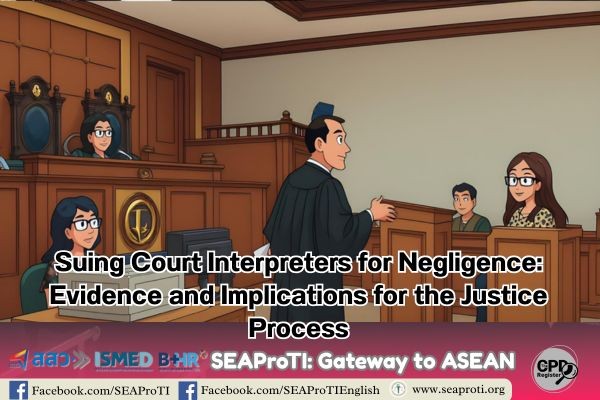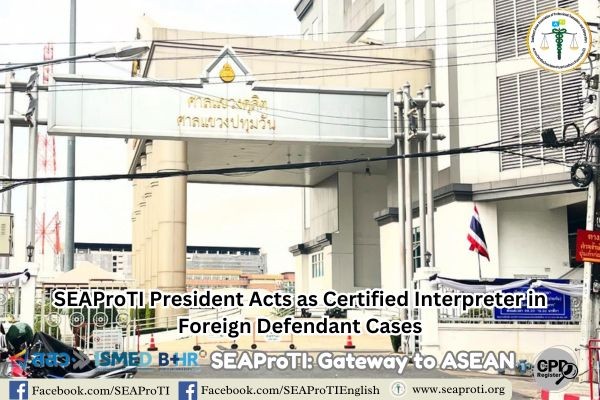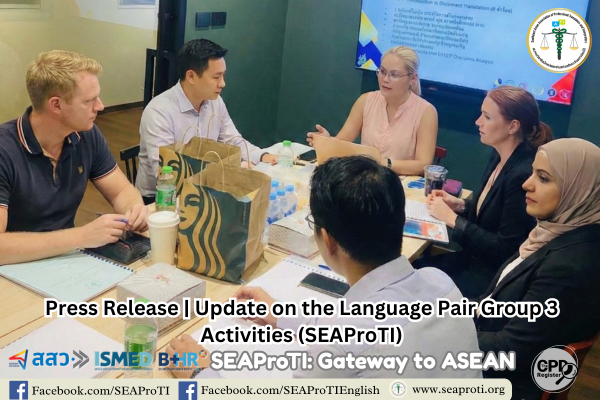Suing Court Interpreters for Negligence: Evidence and Implications for the Justice Process
1 October 2025, Bangkok – In judicial proceedings, accurate interpretation is considered a fundamental right of the parties, in line with human rights and the principle of fair trial. When a court interpreter makes errors due to negligence, which adversely affect a party’s rights, the injured party has the right to pursue legal action against the interpreter. However, proving such negligence requires substantial evidence. Courts typically examine documents, witness testimonies, and related materials that demonstrate the interpreter’s conduct and errors (Mikkelson, 2017; González et al., 2012).
Types of Crucial Evidence
1. Court Records
Official records of interpretation, such as hearing transcripts and documents signed by interpreters, may be scrutinized to detect inconsistencies between the original message and the interpretation provided.
2. Audio or Video Recordings
If the court has audio or video recordings of the hearing, these can serve as crucial evidence. They enable a direct comparison between the original statements and the interpreter’s rendition, highlighting exactly where misinterpretations occurred and how they impacted understanding (Berk-Seligson, 2009).
3. Witness Testimonies
Witnesses present at the hearing—such as litigants, attorneys, or court officials—may testify whether the interpreter rendered the content inaccurately or omitted information.
4. Supporting Documents
This may include original pleadings, contracts, or source-language documents compared with the interpreter’s version, as well as materials showing the consequences of errors, such as altered rulings stemming from mistranslations.
Key Issues in Proving Negligence
Direct Comparison of Original and Interpreted Texts
Demonstrating clear discrepancies between the source material and the interpretation.
Impact on Rights or Case Outcome
Evidence must show that the interpreter’s negligence materially affected the litigant’s rights or the outcome of the trial, rather than being a minor error.
Negligent Conduct
Acts such as failing to take an oath before interpreting, omitting essential content, or a lack of preparation may reinforce a claim of negligence.
Conclusion
Suing a court interpreter for negligence requires specialized evidence that clearly demonstrates factual errors and their direct impact on the litigant’s rights and the judicial process. Essential forms of evidence include court transcripts, audio/video recordings, witness testimonies, and documentary comparisons. Without such evidence, courts may regard the errors as minor and insufficient grounds for legal liability.
References
- Berk-Seligson, S. (2009). Coerced confessions: The discourse of bilingual police interrogations. Berlin: Mouton de Gruyter.
- González, R. D., Vásquez, V. F., & Mikkelson, H. (2012). Fundamentals of court interpretation: Theory, policy, and practice. Durham, NC: Carolina Academic Press.
- Mikkelson, H. (2017). Introduction to court interpreting. London: Routledge.
About Certified Translators, Translation Certifiers, and Certified Interpreters of SEAProTI
The Southeast Asian Association of Professional Translators and Interpreters (SEAProTI) has formally announced the qualifications and requirements for registration of Certified Translators, Translation Certification Providers, and Certified Interpreters in Sections 9 and 10 of the Royal Gazette, published by the Secretariat of the Cabinet, Office of the Prime Minister of Thailand, on 25 July 2024 (Vol. 141, Part 66 Ng, p. 100). Certified Translators, Translation Certification Providers, and Certified Interpreters
The Council of State has proposed the enactment of a Royal Decree, granting registered translators and recognized translation certifiers from professional associations or accredited language institutions the authority to provide legally valid translation certification (Letter to SEAProTI dated April 28, 2025)
SEAProTI is the first professional association in Thailand and Southeast Asia to implement a comprehensive certification system for translators, certifiers, and interpreters.
Head Office: Baan Ratchakru Building, No. 33, Room 402, Soi Phahonyothin 5, Phahonyothin Road, Phaya Thai District, Bangkok 10400, Thailand
Email: hello@seaproti.com | Tel.: (+66) 2-114-3128 (Office hours: Mon–Fri, 09:00–17:00)
การฟ้องร้องล่ามศาลฐานประมาทเลินเล่อ: หลักฐานและผลกระทบทางกระบวนการยุติธรรม
1 ตุลาคม 2568, กรุงเทพมหานคร – ในกระบวนการยุติธรรม การแปลอย่างถูกต้องถือเป็นสิทธิขั้นพื้นฐานของคู่ความตามหลักสิทธิมนุษยชนและความเป็นธรรมในการพิจารณาคดี หากล่ามศาลกระทำการ แปลผิดพลาดโดยประมาทเลินเล่อ (negligence) จนอาจส่งผลกระทบต่อสิทธิของคู่ความ การฟ้องร้องล่ามในฐานะผู้ปฏิบัติหน้าที่ผิดพลาดย่อมเป็นสิทธิของผู้เสียหาย อย่างไรก็ดี การพิสูจน์ข้อเท็จจริงจำเป็นต้องอาศัยหลักฐานที่มีน้ำหนักเพียงพอ ซึ่งศาลจะพิจารณาจากเอกสาร พยานบุคคล และหลักฐานเชื่อมโยงที่แสดงให้เห็นถึงพฤติกรรมหรือข้อผิดพลาดดังกล่าว (Mikkelson, 2017; González et al., 2012)
ประเภทหลักฐานที่สำคัญ
1. รายงานกระบวนพิจารณาในศาล
บันทึกคำแปลและลายมือชื่อของล่ามในแต่ละครั้ง เช่น รายงานการพิจารณาคดี (transcripts) และเอกสารที่ล่ามลงชื่อรับรอง สามารถใช้ตรวจสอบว่ามีความคลาดเคลื่อนระหว่างคำแปลกับต้นฉบับหรือไม่
2. เทปบันทึกเสียงหรือวิดีโอ
หากมีการบันทึกเสียงหรือภาพระหว่างกระบวนพิจารณา สามารถนำมาใช้พิสูจน์ได้อย่างเป็นรูปธรรมว่าล่ามแปลผิดตรงจุดใด และความผิดพลาดนั้นส่งผลต่อความเข้าใจของศาลและคู่ความอย่างไร (Berk-Seligson, 2009)
3. พยานบุคคล
บุคคลที่อยู่ในเหตุการณ์ เช่น คู่ความ ทนายความ หรือเจ้าหน้าที่ศาล สามารถเบิกความยืนยันได้ว่าล่ามแปลผิดหรือละเลยการแปลบางส่วน
4. เอกสารประกอบ
เช่น สำเนาคำฟ้อง ต้นฉบับสัญญา หรือเอกสารภาษาเดิมที่เปรียบเทียบกับคำแปล ตลอดจนเอกสารที่แสดงถึง ผลกระทบจากความผิดพลาด เช่น คำพิพากษาที่อาจเปลี่ยนไปเพราะการตีความคลาดเคลื่อน
ประเด็นสำคัญในการพิสูจน์
- การเปรียบเทียบต้นฉบับกับคำแปล เพื่อแสดงให้เห็นความคลาดเคลื่อนที่พิสูจน์ได้จริง
- ผลกระทบต่อสิทธิหรือผลคดี ต้องพิสูจน์ว่าความผิดพลาดมีผลกระทบต่อสิทธิของคู่ความ ไม่ใช่เพียงข้อผิดเล็กน้อย
- พฤติกรรมที่เข้าข่ายความประมาท เช่น การไม่สาบานตนก่อนเริ่มงาน หรือการแปลไม่ครบถ้วน อาจถูกใช้เป็นเหตุประกอบการฟ้องร้อง
บทสรุป
การฟ้องร้องล่ามศาลฐานประมาทเลินเล่อจำเป็นต้องอาศัย หลักฐานเฉพาะทาง ที่สามารถพิสูจน์ข้อเท็จจริงได้อย่างชัดเจน โดยเฉพาะหลักฐานจาก รายงานศาล เทปบันทึกเสียง พยานบุคคล และเอกสารต้นฉบับ ซึ่งต้องเชื่อมโยงกับผลกระทบที่เกิดขึ้นจริงต่อคู่ความและกระบวนการยุติธรรม หากปราศจากหลักฐานดังกล่าว ศาลอาจเห็นว่าเป็นเพียงความผิดเล็กน้อยที่ไม่ถึงขั้นเป็นเหตุแห่งการฟ้องร้องได้
เอกสารอ้างอิง
- Berk-Seligson, S. (2009). Coerced confessions: The discourse of bilingual police interrogations. Berlin: Mouton de Gruyter.
- González, R. D., Vásquez, V. F., & Mikkelson, H. (2012). Fundamentals of court interpretation: Theory, policy, and practice. Durham, NC: Carolina Academic Press.
- Mikkelson, H. (2017). Introduction to court interpreting. London: Routledge.
เกี่ยวกับนักแปลรับรอง ผู้รับรองการแปล และล่ามรับรองของสมาคมวิชาชีพนักแปลและล่ามแห่งเอเชียตะวันออกเฉียงใต้
* สมาคมวิชาชีพนักแปลและล่ามแห่งเอเชียตะวันออกเฉียงใต้ (SEAProTI) ได้ประกาศหลักเกณฑ์และคุณสมบัติผู้ที่ขึ้นทะเบียนเป็น “นักแปลรับรอง (Certified Translators) และผู้รับรองการแปล (Translation Certification Providers) และล่ามรับรอง (Certified Interpreters)” ของสมาคม หมวดที่ 9 และหมวดที่ 10 ในราชกิจจานุเบกษา ของสำนักเลขาธิการคณะรัฐมนตรี ในสำนักนายกรัฐมนตรี แห่งราชอาณาจักรไทย ลงวันที่ 25 ก.ค. 2567 เล่มที่ 141 ตอนที่ 66 ง หน้า 100 อ่านฉบับเต็มได้ที่: นักแปลรับรอง ผู้รับรองการแปล และล่ามรับรอง
** สำนักคณะกรรมการกฤษฎีกาเสนอให้ตราเป็นพระราชกฤษฎีกา โดยกำหนดให้นักแปลที่ขึ้นทะเบียน รวมถึงผู้รับรองการแปลจากสมาคมวิชาชีพหรือสถาบันสอนภาษาที่มีการอบรมและขึ้นทะเบียน สามารถรับรองคำแปลได้ (จดหมายถึงสมาคม SEAProTI ลงวันที่ 28 เม.ย. 2568)
*** สมาคมวิชาชีพนักแปลและล่ามแห่งเอเชียตะวันออกเฉียงใต้ เป็นสมาคมวิชาชีพแห่งแรกในประเทศไทยและภูมิภาคเอเชียตะวันออกเฉียงใต้ที่มีระบบรับรองนักแปลรับรอง ผู้รับรองการแปล และล่ามรับรอง
สำนักงานใหญ่: อาคารบ้านราชครู เลขที่ 33 ห้อง 402 ซอยพหลโยธิน 5 ถนนพหลโยธิน แขวงพญาไท เขตพญาไท กรุงเทพมหานคร 10400 ประเทศไทย
อีเมล: hello@seaproti.com โทรศัพท์: (+66) 2-114-3128 (เวลาทำการ: วันจันทร์–วันศุกร์ เวลา 09.00–17.00 น.)

























